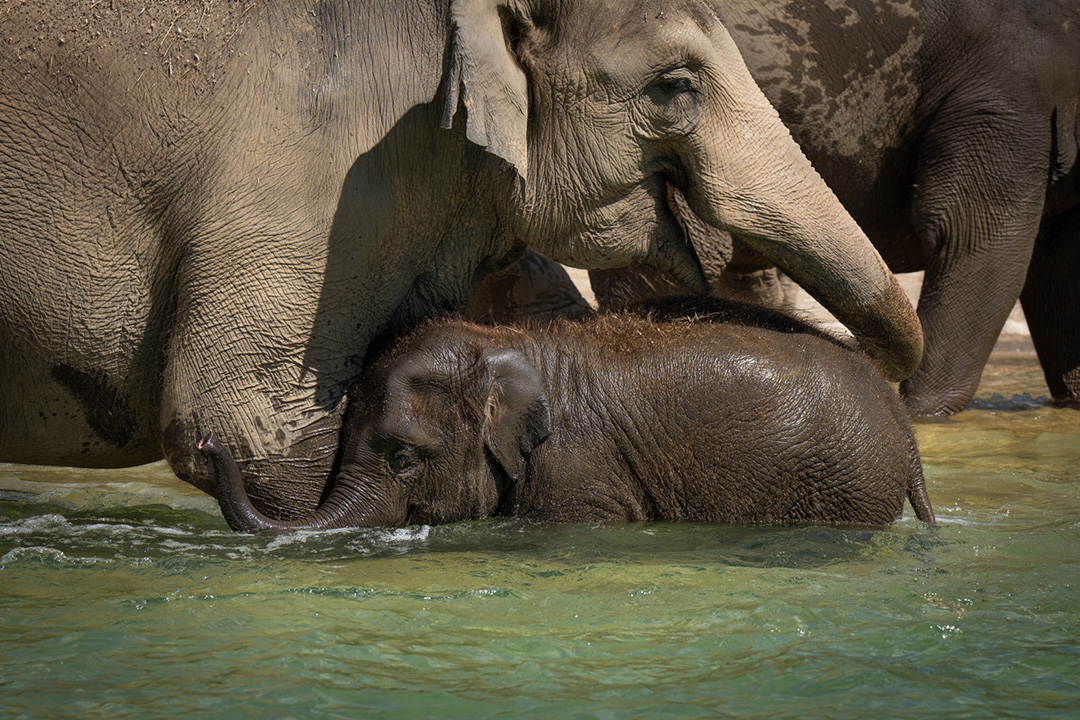The IUCN Species Survival Commission, the Wildlife Trust of India, and the Columbus Zoo and Aquarium in Powell, Ohio, have joined forces in a unique partnership to establish a new Center for Species Survival (CSS) in India focused on Asian elephants.
There are 17 other CSSs deployed around the world, all of which are housed at leading conservation organizations. CSS partnerships recognize that accredited zoos and aquariums, like the Columbus Zoo, offer critical knowledge and data from decades of caring for endangered species and engaging with visitors to raise awareness.
CSS: Asian Elephant is based in the species’ native range in India which holds 60 percent of the global Asian elephant population. While other CSS programs focus on groups of plants and animals, CSS: Asian Elephant is the first CSS to focus on one species.
Asian elephants, an endangered species of cultural and ecological significance, face numerous threats across their native range, which spans 13 countries. To counter these challenges, CSS: Asian Elephant partners are collaborating with representatives from each country to strategically create a hub for research, conservation planning, public awareness, and capacity-building within the species’ native range.

This groundbreaking initiative aligns with the goals of the IUCN Species Survival Commission Asian Elephant Specialist Group and is a significant step towards fulfilling the agreed-upon range state commitments of the 2022 Kathmandu Declaration for Asian Elephant Conservation and the IUCN Species Survival Commission Asian Elephant Action Plan.
“CSS: Asian Elephant provides an innovative model for partnerships among conservation organizations in distant regions of the world,” said Jon Paul Rodríguez, chair, IUCN Species Survival Commission. “We encourage others to consider supporting the work of Species Survival Commission groups in this way, mobilizing human and financial resources, as well as ex situ and in situ expertise, where they are most needed, directly supporting animals, fungi, and plants in their native ranges.”
The partners and government representatives will collaborate to establish and sustain CSS: Asian Elephant. Over the next year, they will work on a shared work plan, sustainability strategy, and stakeholder engagement to achieve key objectives, including:
- Resource Hub: The center will serve as a collaborative range-wide resource center for Asian elephants that will facilitate the exchange of scientific knowledge and conservation solutions among stakeholders in range countries.
- Capacity Building: The CSS will conduct in-country capacity-building efforts on priority topics, ranging from census techniques to human-elephant coexistence solutions.
- Education and Community Engagement: It will serve as a model for Asian elephant interpretive experiences, offering educational opportunities for tourists, local communities, students, and experts.
- Workshops and Training: The center will host workshops and training programs, such as capacity-building workshops and international collaborative elephant conservation planning sessions.
- Emergency Response Fund: The partnership aims to establish a grant fund for emergency human-elephant conflict mitigation across the range countries.

“Asian elephants’ range states have a lot of issues in common, and there is much sharing and learning that can be done,” said Vivek Menon, chair of the IUCN Species Survival Commission Asian Elephant Specialist Group and founder, trustee, and executive director of Wildlife Trust of India. “For a voluntary Specialist Group to have the facilities of a Center in a range state providing dedicated staff to help turn range states’ aspirations and declarations into reality is a step in the right direction.”
In addition to shared responsibilities and direct collaboration with all stakeholders, each partner offers a unique role in the success of CSS Asian Elephant.
The IUCN Species Survival Commission will support connections between the CSS Asian Elephant team and the wider Species Survival Commission network and provide training, tools, and regular communication support. They will promote the partnership and its goals across the global conservation community.
The Wildlife Trust of India will create and host the CSS Asian Elephant team, working on assessment, planning, and action initiatives. They will provide resources, administrative support, and annual reporting on the CSS’s activities.
The Columbus Zoo and Aquarium will provide full funding for the CSS for the first five years, ensuring the successful launch of the center. The Zoo has also committed to long-term sustainability, offering staff expertise and engaging in decision-making and activities critical to the center’s success.
“The Columbus Zoo and Aquarium has a long history of supporting Asian elephant conservation,” said Tom Schmid, president and chief executive officer of the Columbus Zoo and Aquarium. “However, understanding the urgent needs of this iconic and imperiled species, we felt it was vital to significantly increase our conservation commitment and develop an innovative approach to saving this species from extinction. That is why we have committed support for the next five years to establish this program.”
Hero Photo Credit: Tamil Nadu, © Wildlife Trust of India
Back to All Stories
